Unit 11 How was your school trip? Section A (Grammar Focus-3b) 课件
文档属性
| 名称 | Unit 11 How was your school trip? Section A (Grammar Focus-3b) 课件 | 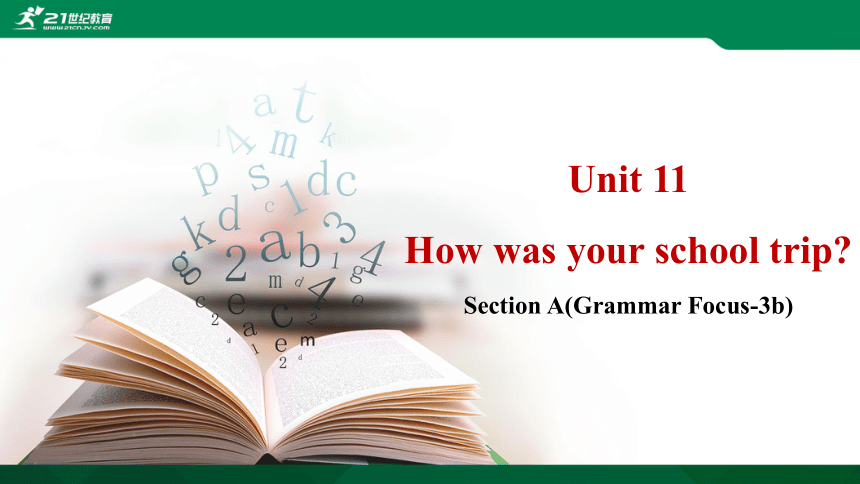 | |
| 格式 | zip | ||
| 文件大小 | 1.2MB | ||
| 资源类型 | 试卷 | ||
| 版本资源 | 人教新目标(Go for it)版 | ||
| 科目 | 英语 | ||
| 更新时间 | 2019-06-15 08:24:47 | ||
图片预览

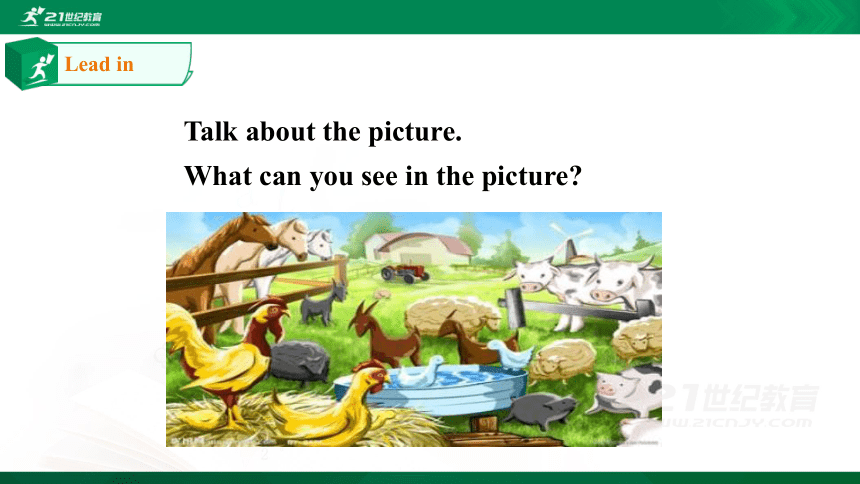
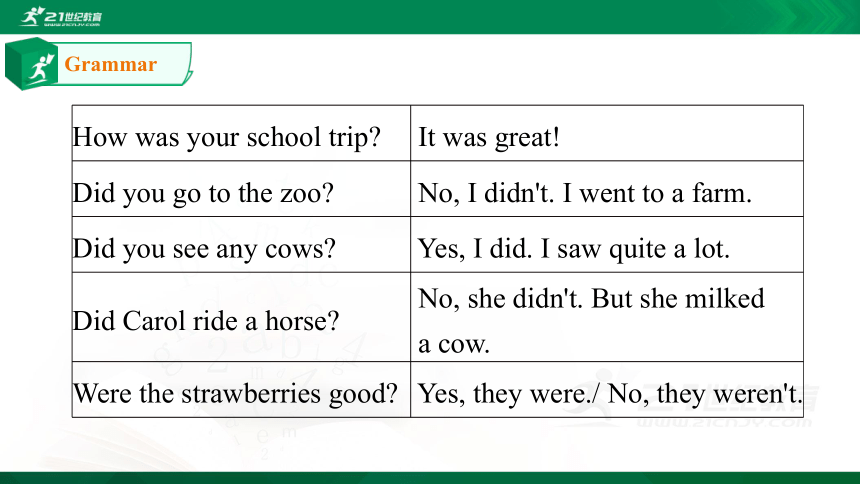
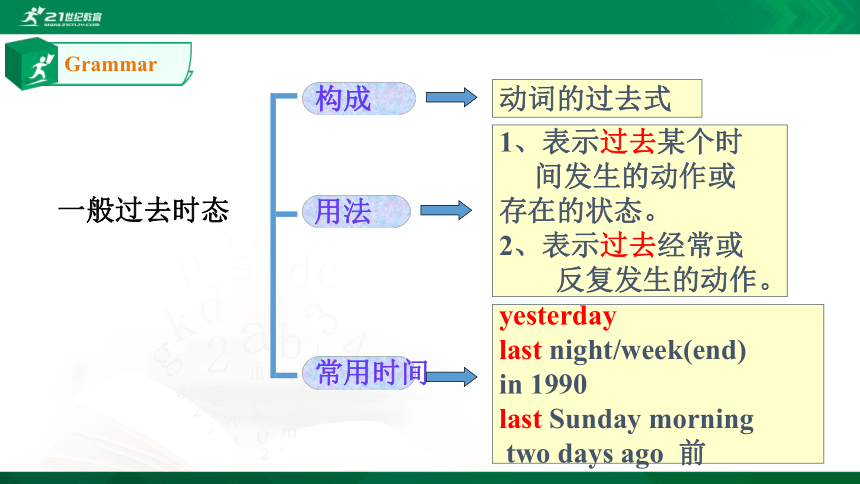
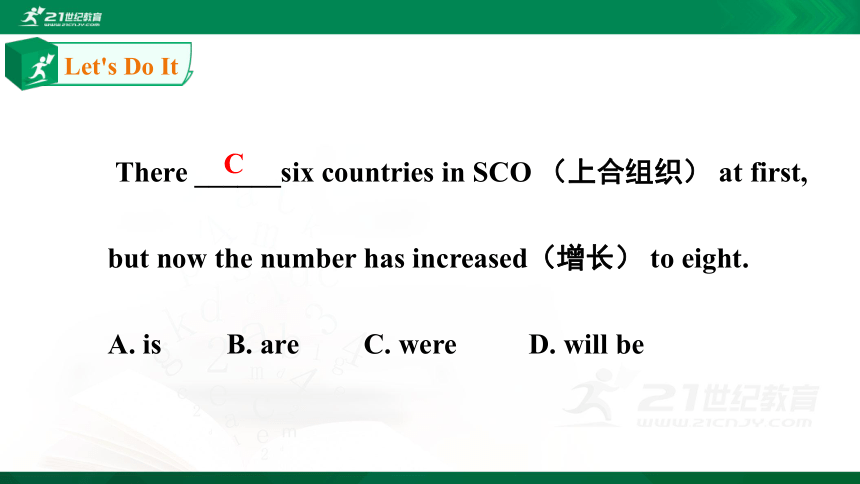
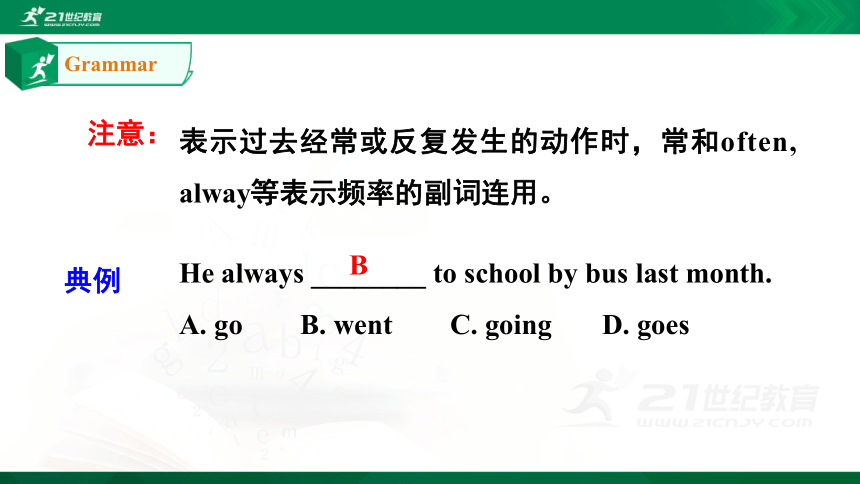
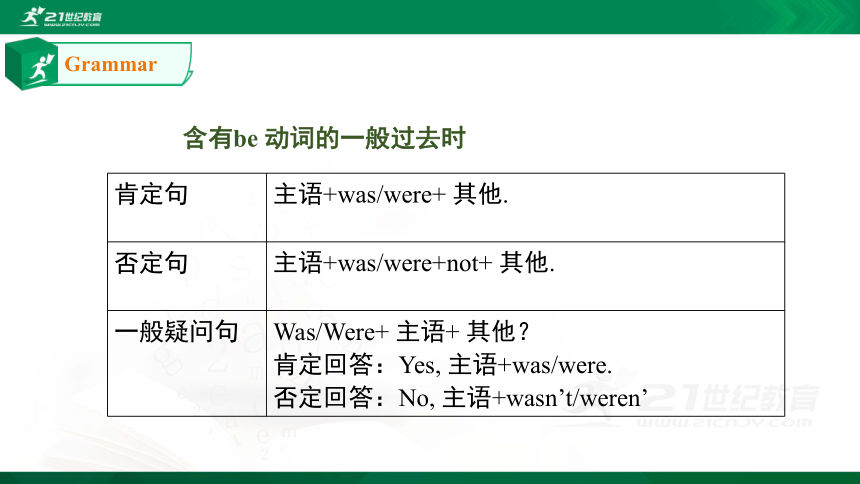
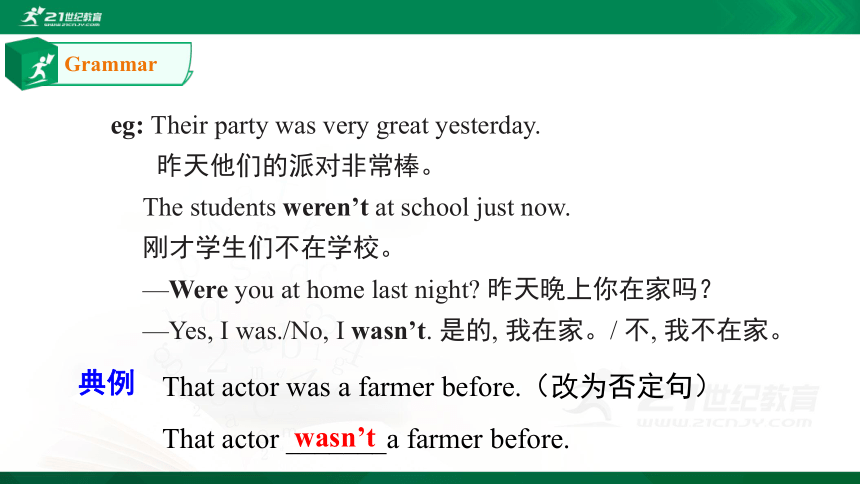
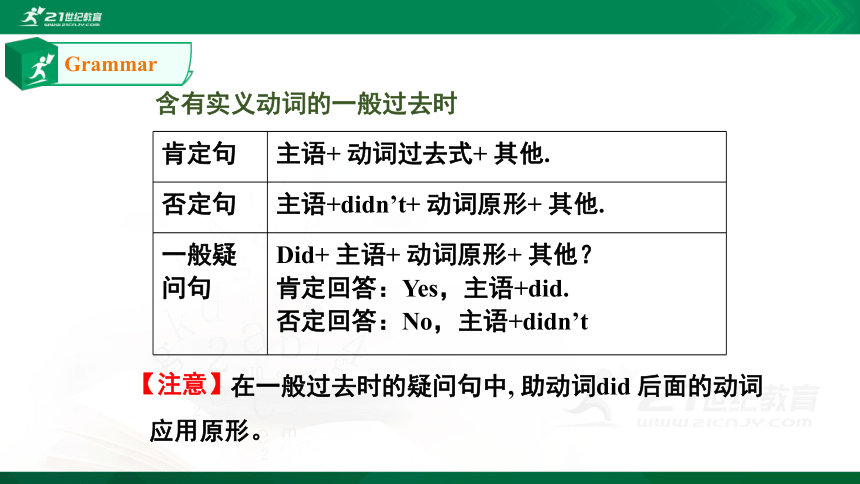
文档简介
Unit 11
How was your school trip?
Section A(Grammar Focus-3b)
Talk about the picture.
What can you see in the picture?
Lead in
How was your school trip? It was great!
Did you go to the zoo? No, I didn't. I went to a farm.
Did you see any cows? Yes, I did. I saw quite a lot.
Did Carol ride a horse? No, she didn't. But she milked
a cow.
Were the strawberries good? Yes, they were./ No, they weren't.
Grammar
一般过去时态
构成
用法
常用时间
动词的过去式
1、表示过去某个时
间发生的动作或
存在的状态。
2、表示过去经常或
反复发生的动作。
yesterday
last night/week(end)
in 1990
last Sunday morning
two days ago 前
Grammar
There ______six countries in SCO (上合组织) at first, but now the number has increased(增长) to eight.
A. is B. are C. were D. will be
C
Let's Do It
注意:
表示过去经常或反复发生的动作时,常和often, alway等表示频率的副词连用。
典例
He always ________ to school by bus last month.
A. go B. went C. going D. goes
B
Grammar
含有be 动词的一般过去时
肯定句 主语+was/were+ 其他.
否定句 主语+was/were+not+ 其他.
一般疑问句 Was/Were+ 主语+ 其他?
肯定回答:Yes, 主语+was/were.
否定回答:No, 主语+wasn’t/weren’
Grammar
eg: Their party was very great yesterday.
昨天他们的派对非常棒。
The students weren’t at school just now.
刚才学生们不在学校。
—Were you at home last night? 昨天晚上你在家吗?
—Yes, I was./No, I wasn’t. 是的, 我在家。/ 不, 我不在家。
典例
That actor was a farmer before.(改为否定句)
That actor _______a farmer before.
wasn’t
Grammar
含有实义动词的一般过去时
肯定句 主语+ 动词过去式+ 其他.
否定句 主语+didn’t+ 动词原形+ 其他.
一般疑
问句 Did+ 主语+ 动词原形+ 其他?
肯定回答:Yes,主语+did.
否定回答:No,主语+didn’t
在一般过去时的疑问句中, 助动词did 后面的动词应用原形。
【注意】
Grammar
eg: They listened to music just now. 刚才他们听音乐了。
→ They didn’t listen to music just now.
刚才他们没听音乐。
→ Did they listen to music just now?
刚才他们听音乐了吗?
Yes, they did./No, they didn’t.
是的, 他们听了。/ 不, 他们没听。
Grammar
巧记动词过去时态
动词一般过去时,表示过去发生的事;
be用was或用were, have,has变had;
谓语动词过去式,过去时间作标志;
一般动词加-ed,若是特殊得硬记。
否定句很简单,主语之后didn’t添;
疑问句也不难,did放在主语前;
如果谓语之前有did,谓语动词需还原;
动词若是was,were,否定其后not添。
Grammar
Regular verbs Irregular verbs
play→played
visit→visited
climb→climbed
study→studied
worry→worried
stop→stopped do→did
is→was
are→were
have→had
eat→ate
buy→bought
Grammar
构成规则 原形 过去式
一般在动词原形末尾加?-ed clean
play
visit cleaned
played
visited
以-e结尾的动词在词尾加?-d live
practice
change lived
practiced
changed
规则动词的过去式的构成
Grammar
构成规则 原形 过去式
末尾只有一个辅音字母的重读闭音节词,先双写这个辅音字母,再加?ed stop
plan stopped
planned
结尾是“辅音字母+y”的动词,先变-y为-i,再加-?ed study
carry studied
carried
Grammar
动词过去式, 构成有规律;
一般情况下, 词尾加-ed;
词尾若有-e, 直接加上-d;
“辅+y”作结尾, 变-y 为-i 加-ed;
一辅重读闭音节, 双写辅音加-ed。
Grammar
写出下列动词的过去式
1. visit ______ 2. play ______
3. study _______ 4. worry _______
5. ride ______ 6. feed ______
7. go ______ 8. stop _______
9. do ______ 10. grow ______
11. have ______ 12. take ______
13. eat ______ 14. see ______
15. buy ______ 16. milk ______
visited
played
studied
worried
rode
fed
went
stopped
did
grew
had
took
ate
saw
bought
milked
Let's Do It
清念 /t/ ,元浊/d/ ;
/t/ /d/ 之后念/id/
规则动词-ed的读音
1、清念 /t/ ,即 ed 在清辅音后面念 /t/ ,
例:finished helped
passed cooked
2、元浊 /d/ ,即 ed 在元音,浊辅音后面念 /d/ ,
例:played enjoyed
called cleaned
3、/t/ /d/ 之后念 /id/ , 即 ed 在 /t/ /d/ 音后面念 /id/
例:wanted shouted
needed counted
Grammar
1. They____ (be) on the farm a moment ago.
2. There____(be) a shop not long ago.
3. Jenny_______(not go) to bed until 11:00 o'clock last night.
4. Danny _____(read) English five minutes ago.
5. I _____(see) Li Lei ____(go) out just now.
6. He ____(do) his homework every day.
But he _______(not do) it yesterday.
7. When I was young, I _____(play) games with my friends.
8. When ____you_____(write) this book? I _____it last year.
9. Did he____(have) lunch at home?
10. I _____(eat) the bread, I 'm full now.
was
didn’t go
was
went
saw
read
didn’t do
does
did
played
wrote
write
have
ate
Let's Do It
3a
Dear Bill,
How _______(is)your school trip yesterday_______(Do) you _______(go)to the zoo? _______(Do)you take any photos? _______(Do)you________(see)any interesting animals? I
_______ (go)to the zoo last year and it_______ (is)a lot of fun.
Jim
Complete Jim's letter on the left and Bill's reply on the right.
was
Did
go
Did
Did
see
went
was
Let's Do It
Dear Jim,
My school trip_______(is)great! We______(have)so much fun!We______(go)to Green Park. We________(climb)the mountains there and_______(see)a lot of flowers. We_______(eat)our lunch under some trees and________(play) some games after that. But at about two o'clock, it______(get)very cloudy and we________ (worry)it would rain. Luckily, it________(do not), and the sun ________(come)outagain!
Bill
was
had
went
climbed
saw
ate
played
got
worried
didn't
came
worry v.& n.担心;担忧
? worry可用作及物动词,后面常接宾语从句。worry作及物动词时还可意为“使担心;使发愁”,常接sb.作宾语。
eg: I always worried that I couldn't pass the exam.
我总是担心我不能通过考试。
Nothing worries me.
我没有什么可担心的。
Language points
?worry还可以用作不及物动词,常与about连用。
don't worry 别担心,用于安慰他人。
eg: I have nothing to worry about.
我没有什么可担心的。
?worry还可作名词。
worry(不可数名词) “烦恼;担心” She has no worry at all.
她没有一点儿烦恼。
worry(可数名词) “令人烦恼的人或事” She is full of worries.
她有种种烦恼。
Language points
④worry的形容词形式为worried(做表语时,主语多为sb.)和worrying(做表语时,主语多为sth.),分别意为“担心的;担忧的”和“令人担忧的”。
eg: I am worried about the coming exam.
我担心即将到来的考试。
It must be worrying for you not to know where
he is.你不知道他的下落一定很着急。
Language points
—Which would you like to read, paper books or e-books?
—My parents only allow me to read paper books. They
______my eyes.
A. talk about B. hear about
C. learn about D. worry about
D
Let's Do It
My Happiest Day
I ______13 years old now. Yesterday ______ my birthday. My parents ____ a birthday party. I invited some friends to the party. In the morning my mother ____ up early and ______ to cook. My father _____ her with cooking. They _____ so busy that they had no time to talk with me.When all my friends arrived, my mother _____ them delicious food and a big birthday cake. My father ______ me new clothes and some books as gifts. I was moved to tears. My friends______ birthday songs for me and gave me some gifts.
I a wonderful birthday.
was
had
am
bought
got
were
helped
began
had
sang
gave
Let's Do It
本节课学习了语法一般过去时 ;动词过去式的变化,并做了相应的练习加以巩固。
Summay
谢谢
21世纪教育网(www.21cnjy.com) 中小学教育资源网站
有大把高质量资料?一线教师?一线教研员?
欢迎加入21世纪教育网教师合作团队!!月薪过万不是梦!!
详情请看:
https://www.21cnjy.com/help/help_extract.php
How was your school trip?
Section A(Grammar Focus-3b)
Talk about the picture.
What can you see in the picture?
Lead in
How was your school trip? It was great!
Did you go to the zoo? No, I didn't. I went to a farm.
Did you see any cows? Yes, I did. I saw quite a lot.
Did Carol ride a horse? No, she didn't. But she milked
a cow.
Were the strawberries good? Yes, they were./ No, they weren't.
Grammar
一般过去时态
构成
用法
常用时间
动词的过去式
1、表示过去某个时
间发生的动作或
存在的状态。
2、表示过去经常或
反复发生的动作。
yesterday
last night/week(end)
in 1990
last Sunday morning
two days ago 前
Grammar
There ______six countries in SCO (上合组织) at first, but now the number has increased(增长) to eight.
A. is B. are C. were D. will be
C
Let's Do It
注意:
表示过去经常或反复发生的动作时,常和often, alway等表示频率的副词连用。
典例
He always ________ to school by bus last month.
A. go B. went C. going D. goes
B
Grammar
含有be 动词的一般过去时
肯定句 主语+was/were+ 其他.
否定句 主语+was/were+not+ 其他.
一般疑问句 Was/Were+ 主语+ 其他?
肯定回答:Yes, 主语+was/were.
否定回答:No, 主语+wasn’t/weren’
Grammar
eg: Their party was very great yesterday.
昨天他们的派对非常棒。
The students weren’t at school just now.
刚才学生们不在学校。
—Were you at home last night? 昨天晚上你在家吗?
—Yes, I was./No, I wasn’t. 是的, 我在家。/ 不, 我不在家。
典例
That actor was a farmer before.(改为否定句)
That actor _______a farmer before.
wasn’t
Grammar
含有实义动词的一般过去时
肯定句 主语+ 动词过去式+ 其他.
否定句 主语+didn’t+ 动词原形+ 其他.
一般疑
问句 Did+ 主语+ 动词原形+ 其他?
肯定回答:Yes,主语+did.
否定回答:No,主语+didn’t
在一般过去时的疑问句中, 助动词did 后面的动词应用原形。
【注意】
Grammar
eg: They listened to music just now. 刚才他们听音乐了。
→ They didn’t listen to music just now.
刚才他们没听音乐。
→ Did they listen to music just now?
刚才他们听音乐了吗?
Yes, they did./No, they didn’t.
是的, 他们听了。/ 不, 他们没听。
Grammar
巧记动词过去时态
动词一般过去时,表示过去发生的事;
be用was或用were, have,has变had;
谓语动词过去式,过去时间作标志;
一般动词加-ed,若是特殊得硬记。
否定句很简单,主语之后didn’t添;
疑问句也不难,did放在主语前;
如果谓语之前有did,谓语动词需还原;
动词若是was,were,否定其后not添。
Grammar
Regular verbs Irregular verbs
play→played
visit→visited
climb→climbed
study→studied
worry→worried
stop→stopped do→did
is→was
are→were
have→had
eat→ate
buy→bought
Grammar
构成规则 原形 过去式
一般在动词原形末尾加?-ed clean
play
visit cleaned
played
visited
以-e结尾的动词在词尾加?-d live
practice
change lived
practiced
changed
规则动词的过去式的构成
Grammar
构成规则 原形 过去式
末尾只有一个辅音字母的重读闭音节词,先双写这个辅音字母,再加?ed stop
plan stopped
planned
结尾是“辅音字母+y”的动词,先变-y为-i,再加-?ed study
carry studied
carried
Grammar
动词过去式, 构成有规律;
一般情况下, 词尾加-ed;
词尾若有-e, 直接加上-d;
“辅+y”作结尾, 变-y 为-i 加-ed;
一辅重读闭音节, 双写辅音加-ed。
Grammar
写出下列动词的过去式
1. visit ______ 2. play ______
3. study _______ 4. worry _______
5. ride ______ 6. feed ______
7. go ______ 8. stop _______
9. do ______ 10. grow ______
11. have ______ 12. take ______
13. eat ______ 14. see ______
15. buy ______ 16. milk ______
visited
played
studied
worried
rode
fed
went
stopped
did
grew
had
took
ate
saw
bought
milked
Let's Do It
清念 /t/ ,元浊/d/ ;
/t/ /d/ 之后念/id/
规则动词-ed的读音
1、清念 /t/ ,即 ed 在清辅音后面念 /t/ ,
例:finished helped
passed cooked
2、元浊 /d/ ,即 ed 在元音,浊辅音后面念 /d/ ,
例:played enjoyed
called cleaned
3、/t/ /d/ 之后念 /id/ , 即 ed 在 /t/ /d/ 音后面念 /id/
例:wanted shouted
needed counted
Grammar
1. They____ (be) on the farm a moment ago.
2. There____(be) a shop not long ago.
3. Jenny_______(not go) to bed until 11:00 o'clock last night.
4. Danny _____(read) English five minutes ago.
5. I _____(see) Li Lei ____(go) out just now.
6. He ____(do) his homework every day.
But he _______(not do) it yesterday.
7. When I was young, I _____(play) games with my friends.
8. When ____you_____(write) this book? I _____it last year.
9. Did he____(have) lunch at home?
10. I _____(eat) the bread, I 'm full now.
was
didn’t go
was
went
saw
read
didn’t do
does
did
played
wrote
write
have
ate
Let's Do It
3a
Dear Bill,
How _______(is)your school trip yesterday_______(Do) you _______(go)to the zoo? _______(Do)you take any photos? _______(Do)you________(see)any interesting animals? I
_______ (go)to the zoo last year and it_______ (is)a lot of fun.
Jim
Complete Jim's letter on the left and Bill's reply on the right.
was
Did
go
Did
Did
see
went
was
Let's Do It
Dear Jim,
My school trip_______(is)great! We______(have)so much fun!We______(go)to Green Park. We________(climb)the mountains there and_______(see)a lot of flowers. We_______(eat)our lunch under some trees and________(play) some games after that. But at about two o'clock, it______(get)very cloudy and we________ (worry)it would rain. Luckily, it________(do not), and the sun ________(come)outagain!
Bill
was
had
went
climbed
saw
ate
played
got
worried
didn't
came
worry v.& n.担心;担忧
? worry可用作及物动词,后面常接宾语从句。worry作及物动词时还可意为“使担心;使发愁”,常接sb.作宾语。
eg: I always worried that I couldn't pass the exam.
我总是担心我不能通过考试。
Nothing worries me.
我没有什么可担心的。
Language points
?worry还可以用作不及物动词,常与about连用。
don't worry 别担心,用于安慰他人。
eg: I have nothing to worry about.
我没有什么可担心的。
?worry还可作名词。
worry(不可数名词) “烦恼;担心” She has no worry at all.
她没有一点儿烦恼。
worry(可数名词) “令人烦恼的人或事” She is full of worries.
她有种种烦恼。
Language points
④worry的形容词形式为worried(做表语时,主语多为sb.)和worrying(做表语时,主语多为sth.),分别意为“担心的;担忧的”和“令人担忧的”。
eg: I am worried about the coming exam.
我担心即将到来的考试。
It must be worrying for you not to know where
he is.你不知道他的下落一定很着急。
Language points
—Which would you like to read, paper books or e-books?
—My parents only allow me to read paper books. They
______my eyes.
A. talk about B. hear about
C. learn about D. worry about
D
Let's Do It
My Happiest Day
I ______13 years old now. Yesterday ______ my birthday. My parents ____ a birthday party. I invited some friends to the party. In the morning my mother ____ up early and ______ to cook. My father _____ her with cooking. They _____ so busy that they had no time to talk with me.When all my friends arrived, my mother _____ them delicious food and a big birthday cake. My father ______ me new clothes and some books as gifts. I was moved to tears. My friends______ birthday songs for me and gave me some gifts.
I a wonderful birthday.
was
had
am
bought
got
were
helped
began
had
sang
gave
Let's Do It
本节课学习了语法一般过去时 ;动词过去式的变化,并做了相应的练习加以巩固。
Summay
谢谢
21世纪教育网(www.21cnjy.com) 中小学教育资源网站
有大把高质量资料?一线教师?一线教研员?
欢迎加入21世纪教育网教师合作团队!!月薪过万不是梦!!
详情请看:
https://www.21cnjy.com/help/help_extract.php
同课章节目录
- Unit 1 Can you play the guitar?
- Section A
- Section B
- Unit 2 What time do you go to school?
- Section A
- Section B
- Unit 3 How do you get to school?
- Section A
- Section B
- Unit 4 Don't eat in class.
- Section A
- Section B
- Unit 5 Why do you like pandas?
- Section A
- Section B
- Unit 6 I'm watching TV.
- Section A
- Section B
- Review of Units 1-6
- Unit 7 It's raining!
- Section A
- Section B
- Unit 8 Is there a post office near here?
- Section A
- Section B
- Unit 9 What does he look like?
- Section A
- Section B
- Unit 10 I'd like some noodles.
- Section A
- Section B
- Unit 11 How was your school trip?
- Section A
- Section B
- Unit 12 What did you do last weekend?
- Section A
- Section B
